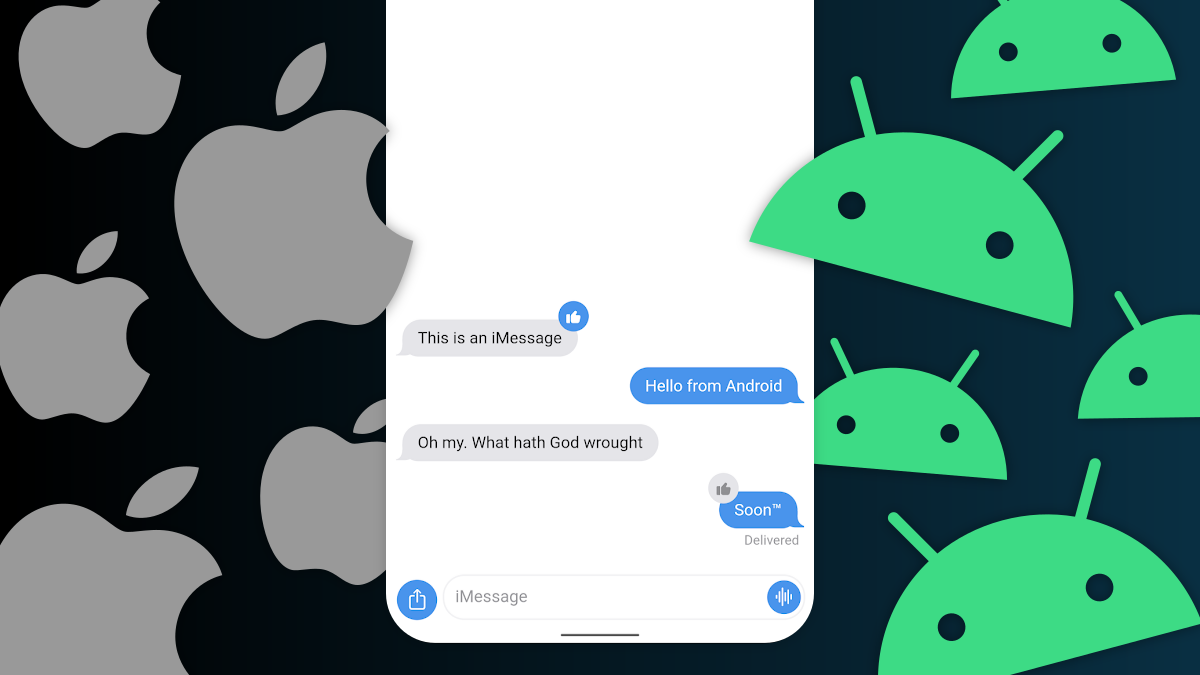iMessage is one of the strongest selling points for the iPhone, but it falls back to using regular SMS when someone in the conversation doesn't have an Apple device. Google wants Apple to fix the problem, but it's not that simple.
Get The Message
Google has embarked on a marketing campaign called #GetTheMessage, which aims to pressure Apple into supporting Rich Communication Service (RCS for short) on iPhones. RCS is a newer standard for text messaging that supports larger file attachments, reactions, varying levels of encryption, read indicators, and other features common in modern messaging services. Android devices can use RCS through the Android Messages application, which is the default texting app on most Android phones.
Theoretically, if Apple integrated RCS support on the iPhone, conversations between people with iPhones and people with Android devices would have many of the same benefits of the Apple-exclusive iMessage service. No more low-resolution photo sharing between iPhone and Android, or repetitive notifications that someone liked a message, or other common problems with using old SMS texting.
Google has already partnered with some celebrities and influencers to promote the campaign, including Madelaine Petsch, Vanessa Hudgens, and ATTN, and more ads are likely on the way. So, is it really Apple's fault that texting with Android devices is difficult?
A Quick Refresher on RCS
Rich Communication Services is not a new technology, as the first version was released in 2008 -- the same year the iPhone 3G was released, and a few years before iMessage even existed. It was an upgrade over SMS texting, but it wasn't compatible across different networks or devices. That only started to change with the introduction of the RCS Universal Profile in November 2016, which made it technically possible for RCS conversations to work across different mobile networks.
The first functioning version of RCS Universal Profile arrived in 2016, but it only worked with Google's own Android Messages app (companies like Samsung and LG had their own texting apps on their phones at the time), and only between Sprint customers. Rogers in Canada joined the party later that year, and other international networks followed, but adoption with networks in the United States remained slow. T-Mobile didn't support it until May 2020, and AT&T followed in June 2021. Verizon started pre-installing Android Messages on all its devices this year.
There are many, many, many other factors in play. Most of the world uses services like WhatsApp and WeChat for mobile messaging instead of iMessage or SMS, so this specific problem is mostly irrelevant to millions (or even billions) of people. RCS also isn't as open of a platform as Google might lead you to believe -- it doesn't work with third-party messaging apps on Android, and no matter what mobile network you're on, your messages usually pass through Google's Jibe servers.
After several years of fighting with mobile networks, Android Messages is the default messaging app on most Android phones, which in turn allows the phones to use RCS messaging. The next challenge for Google is working with Apple to support RCS.
The Battle with Apple
So, is Apple blocking RCS from working on iPhones? Technically, there's nothing stopping Apple from integrating RCS into its iMessage infrastructure. Apple could also side-step the problem and make an iMessage app for Android phones, giving both platforms an equal texting experience.
However, Apple has many incentives to not do that. iMessage is why many people buy an iPhone over an Android device, much in the same way that BlackBerry Messenger (BBM) was a strong selling point for BlackBerry phones in the 2000s. iMessage's features only work in group conversations if every person has an iPhone, which incentivizes iPhone owners to keep Android people out of chats or make jokes about "green bubbles" (SMS messages appear as green on iPhone, instead of blue).
The marketing campaign mirrors other disputes between large companies we've seen in recent years. TV providers and networks often fight over distribution rights, which usually involves each company complaining about the other one in public, and calling on customers to pressure the other party into signing a more agreeable deal. Epic Games promoted a #FreeFortnite campaign in 2020, after Fortnite was removed from the Apple App Store and Google Play Store, with the goal of framing Epic as waging a war against unjust app store rules. The company even made a mock version of Apple's famous 'Nineteen Eighty-Four' Super Bowl advertisement, framing Apple as a Big Brother-type villain.
It would be great for everyone, except Apple executives and shareholders, if text messaging was less of a pain between iPhone and Android phones. However, RCS isn't that great of a solution -- there's limited support for end-to-end encryption, and messages can pass through servers owned by any number of companies and mobile networks. Android devices also can only use RCS with the Android Messages app, so in real world usage, it's not that different from everyone being stuck with WhatsApp or Facebook Messenger.
There's no reason for Verizon, Google, or even Apple to know the contents of your conversations -- we should be pushing for a fully-encrypted messaging future. If you want a great messaging experience across all your friends and family's devices, your best bet is convincing everyone to use Signal, Telegram, or another service that doesn't involve iMessage or SMS at all.


